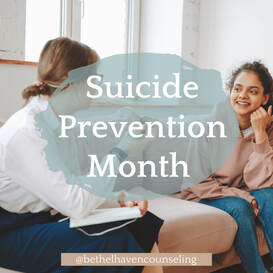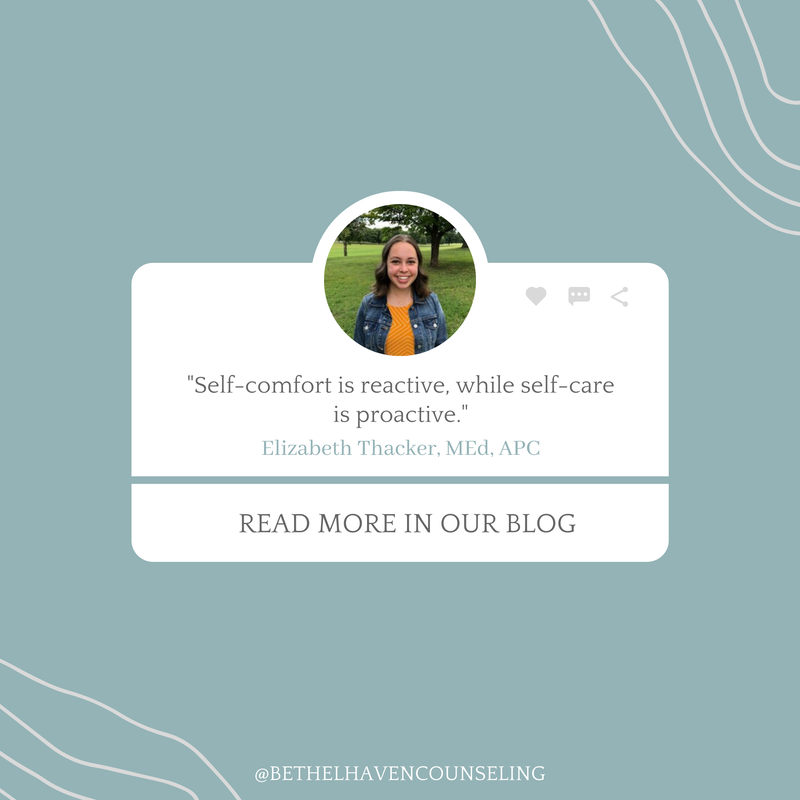 September is National Suicide Prevention Month, so let’s take some time to talk about suicide. I have recently seen many valuable conversations surrounding the idea that National Suicide Prevention Month should not be limited to “check in with your friends,” and I strongly agree with that. There are many systemic issues that lead to suicide and in order to truly “prevent” suicide, they need to be addressed. These issues include but are not limited to:
This blog post is about how to help someone who is suicidal, but this conversation cannot be had without acknowledging the larger issues that lead to suicide. I could (and may), write a completely different post about these issues, but please keep them in mind as you think about helping those you care about. When I talk about my job with people outside of the field, I notice that they tend to get uncomfortable when I mention that I work with people who are suicidal. There’s something about that word or idea that people tend to shy away from, or see as “taboo,” but suicidal thoughts are not something to be ashamed of. Suicidal thoughts are more common than you’d think and are a symptom of great inner pain. Our brains are very efficient problem solvers. When presented with a problem, for example, high amounts of stress, our brains work to come up with the quickest and easiest solution to stop that stress. Often, that solution is distracting ourselves with our phones or ignoring the stress, even if that’s not the healthiest response and the stress comes back to bite us later. For someone in deep physical, mental, and/or emotional pain, a solution to stop that pain would be to not exist anymore. Suicidal thoughts can be someone’s way of trying to solve the problem of pain, even if it’s not the solution we would want them to take. There are other options to solve the problem of pain, they can just require more work and do not always have immediate effects. These thoughts are not a sign of weakness or selfishness, but are simply one’s way of trying to manage their hurt. Suicidal thoughts also exist on a spectrum. On one end of the spectrum, someone might be having thoughts like, “I wish I could just sleep forever so I didn’t have to feel this way anymore.” If we keep moving down the spectrum, another thought might be “I want to kill myself so I won’t be experiencing this pain.” On the other end, you might have a thought like, “I am going to kill myself on Saturday night by using those pills I saw in mom’s medicine cabinet.” These thoughts are not a sign of weakness or selfishness, but are simply one’s way of trying to manage their hurt. Now that you’ve read about some of the basics, here are some ways to help or get involved. If you are worried that someone you know might be experiencing suicidal thoughts, there are some things you can look out for. The following list, taken from Suicide Awareness Voices of Education, can be warning signs of suicide:
If you notice someone you love showing some of those warning signs, you might become worried and wonder what to do. The Suicide Prevention Lifeline has some suggestions to help. Let’s talk about these:
If someone expresses that they are actively suicidal (meaning that they tell you they have a plan, they have access to the means to carry out that plan, and they have the intent to carry out that plan), it might be time to seek professional help. Offer to sit with them while calling the National Suicide Prevention Hotline at 1-800-273-8255 or in the state of Georgia, you can call the Georgia Crisis and Access Line at 1-800-715-4225. If more immediate assistance is needed, call Emergency Medical Services and stay with the individual until help arrives. See the end of this post for a more detailed list of suicide crisis lines.
As you are working to care for someone in such deep pain, make sure that you are also being taken care of. Crises are challenging for both those experiencing the crisis as well as those supporting the individual experiencing the crisis. By taking care of yourself, you are able to have the time and energy to devote to your loved ones to show them you care and want them around. Below is a more comprehensive list of national suicide crisis lines (taken from this Wikipedia page):
0 Comments
Elizabeth Thacker, MEd, APCBethel Haven Staff Therapist Self-care is a popular term thrown around these days. I often ask my clients “how are you taking care of yourself?” because if we don’t take care of ourselves, we are going to get burnt out. The popular understanding of self-care includes things like bubble baths, watching movies, or doing some skincare. And these are important and wonderful things to do if you are able but might better be categorized under the idea of “self-comfort.”
I was first introduced to the idea that there is a distinction between “self-care” and “self-comfort” a few months ago while reading Sarah Bessey’s book, Miracles and Other Reasonable Things (I highly recommend all her books, by the way). This book details some of Bessey’s struggles with her faith and her experience recovering from physical injury. At one point in her story, Bessey notes that there is a difference between “self-care” and “self-comfort” and this concept has stuck with me. Bessey’s book led me to investigate this concept a little more. I haven’t talked to anyone recently who hasn’t needed a little more care and comfort, so I wanted to share what I learned about them and when they are most appropriate. One way I can think to illustrate the difference between these two concepts is that self-comfort is a warm bubble bath, while self-care is regular personal hygiene. Self-comfort is often easy and helpful in the moment, but fleeting, while self-care can sometimes be difficult and challenging, but sets us up for healthy practices in the long term. A good analogy would be that self-comfort is what you do when you have hit “E” on your fuel gauge, while self-care is what you do to keep your tank from emptying out in the first place. Self-comfort is reactive, while self-care is proactive. My understanding of self-comfort is self-soothing. When we are stressed or overwhelmed, needing warmth, or a break, self-comfort is a wonderful thing to utilize. Take that break and watch your favorite show. Enjoy that candy you’ve been saving for a while (it’s called comfort food for a reason!). Go for that run to get out your nervous energy. Self-comfort helps us regulate in the moment when things get to be too much. Self-care is what we do to prevent us from getting overwhelmed as often or as extremely. These things can look like practicing mindfulness, making sure you are eating enough every day, setting up a proper sleep routine, budgeting, getting outside and moving your body, going to therapy, unplugging from social media, etc. When these kinds of things become a regular practice, you will be better able to handle when things become overwhelming and stressful because your tank is fuller than if you hadn’t been taking care of yourself. Self-care and self-comfort are both important and necessary at times. It’s not that one is harmful and one is healthy, but determining which is appropriate is important. Below is an incomplete list of suggestions that can help you get started on your way towards proper self-comfort and self-care. Self-comfort - things you can do when feeling overwhelmed
Self-care - things you can do regularly to help prevent being overwhelmed as often
If you want to learn more about how to better take care of yourself, therapy can be a great place to start. A counselor can help you find what works for you and encourage you to make the changes you have been wanting to make. |
Bethel HavenWritten by our counselors to help promote your help, hope, healing Archives
June 2021
Categories |

1622 Mars Hill Road Suite A Watkinsville, GA 30677
P: 706-310-9046
[email protected]
Bethel Haven, Inc.
Copyright © 2016

 RSS Feed
RSS Feed
